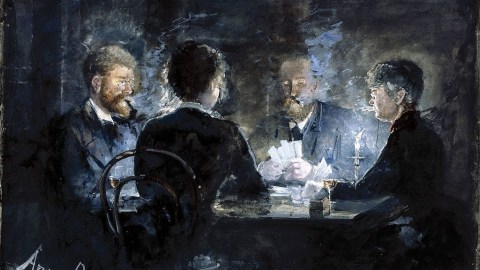4 new personality types revealed by huge study

(Anna Palm de Rosa, Public Domain)
- An analysis of a massive amount of data reveals four new personality types.
- The study is the first to take self-reporting out of the equation.
- The four new types are “average,” “reserved,” “self-centered,” and “role model”.
What type of person are you? How about that other person? We’ve long been interested in sorting ourselves and others into personality types, as if knowing what type of person someone is would allow us to reliably predict their behavior. It would be nice—or maybe boring?—to have this kind of advance knowledge. But categorizing people in any kind of useful, reliable way has proven to be an elusive goal. Most methods rely on self-reporting, which can be dishonest, or even delusional, and exacerbated by small data sets. A study just published in the journal Nature Human Behavior, however, took a different approach. It analyzed the traits of 1.5 million people to arrive at the conclusion that there are just four types of person:
- average
- reserved
- self-centered
- role model

The Myers-Briggs categories, which is generally considered to be discredited among psychologists.
(Jake Beach, Wikimedia)
Myers-Briggs Personalities
There have been other well-known but ultimately insufficient attempts at grouping us in the past. The Myers-Briggs system sorts people into 16 archetypes based on Carl Jung’s observations of acquaintances and literary references. The system is largely discredited these days, with its questions viewed as having been poorly written and its results inconsistent. Eureka College psychologist Alexander Swan tells the Washington Post, “The social psychology community is pretty in line with being anti-Myers-Briggs Type personality assessments.”

The Big Five personality types
(Big Think)
The Big Five Personality Types
Psychologists view the “Big Five” personality types as more reliable than the Myers-Briggs system. Although it also relies on research in which subjects self-report their natures, the five personality traits do successfully align with peer assessments. As ever, though, each subject’s honesty and the limited sample is key. Do they really let go of grudges, for example? And might they be concerned with promoting a certain self-image to the questioners?

(Steven Su, Unsplash)
How the new study on personality types worked
The new research was performed at Northwestern University by Martin Gerlach, Beatrice Farb, William Revelle, and Luís A. Nunes Amaral. While again based on self-reporting, the scientists believe the sheer numbers of respondents enabled their analysis to smooth out any deliberate or subconscious subterfuge in the final results.
Questionnaires were administered online to volunteers interested in learning more about themselves. There were four questionnaires with between 44 and 300 questions that had been developed over the decades by the greater psychological research community, including those developed for Big Five testing.
After the data was compiled, the researchers used standard modeling algorithms to find significant patterns.

How each group relates to the Big Five categories
(Northwestern University)
Lumps in the data
The team stumbled across their four types after a failed attempt to derive consistent trait clusters—Psychologist Revelle called them “lumps in the batter”—that led them to a dozen new, and questionable, personality types. Revelle dismissed them: “No cigar.”
The researchers tried out different algorithms until they landed on a model that finally produced consistent, sensible outcomes: three smaller groupings and one larger cluster, which they labeled “average.” When the team tested this approach on two other data sets, they got the same successful results.
Understanding the four personality types
The researchers explained the new groupings in a Northwestern press release.
- Average: Average people are high in neuroticism and extraversion, while low in openness. “I would expect that the typical person would be in this cluster,” says Gerlach. Females are more likely than males to fall into the Average type.
- Reserved: The Reserved type is emotionally stable, but not open or neurotic. They are not particularly extraverted but are somewhat agreeable and conscientious.
- Role Models: Role Models score low in neuroticism and high in all the other traits. The likelihood that someone is a role model increases dramatically with age. “These are people who are dependable and open to new ideas,” Amaral says. “These are good people to be in charge of things. In fact, life is easier if you have more dealings with role models.” Women are more likely than men are likely to be role models.
- Self-Centered: Self-Centered people score very high in extraversion and below average in openness, agreeableness, and conscientiousness. “These are people you don’t want to hang out with,” according to Revelle. There is a very dramatic decrease in the number of self-centered types as people age in both with women and men.





